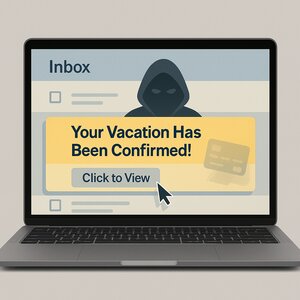 The Summer Travel Scam That Could Compromise Your Business
The Summer Travel Scam That Could Compromise Your Business
Planning a vacation—or a business trip—this summer? Watch out. A new wave of phishing scams is targeting travelers with fake booking confirmation emails that look almost identical to the real thing.
From airline and hotel reservations to car rentals and conference bookings, cybercriminals are banking on your team being too busy—or too excited—to spot a fake. One click on the wrong email, and your company’s sensitive data or funds could be at risk.
How This Phishing Scam Works
1. You Get a Fake Travel Confirmation Email
It might look like it’s from Delta, Marriott, Expedia, or another trusted brand. The email uses real logos, formatting, and even “customer support” links.
Common subject lines include:
-
“Your Trip to Orlando Has Been Confirmed – View Now”
-
“Your Itinerary Has Changed – Action Required”
-
“Final Step: Confirm Your Hotel Stay”
2. You Click the Link
The message urges you to log in or update your payment info. But instead of going to the real travel site, you’re redirected to a fake version designed to steal your login or credit card info.
3. They Steal Your Data or Infect Your Device
Once you enter your credentials or payment details, they’re in the hands of cybercriminals. Some links even contain malware that can infect your device—and your entire business network.
Why Even Smart Business Owners Are Falling For It
These phishing emails are:
-
Convincing – They look nearly identical to real travel confirmations.
-
Urgent – Subject lines create panic, prompting fast clicks without second thoughts.
-
Perfectly Timed – Summer is peak travel season, and distractions are high.
And when your office manager, assistant, or travel coordinator is handling multiple business bookings, it only takes one fake email to put your company at risk.
The Business Risks: It’s More Than Just a Personal Problem
If your team travels for work, handles reservations, or books conferences, this scam has serious implications:
-
Your company credit cards could be compromised
-
Corporate travel accounts could be hijacked
-
Malware could spread through your entire network
This is more than a minor inconvenience—it’s a cybersecurity threat with real financial and reputational damage.
How to Protect Your Business From Fake Booking Emails
-
Never Click Email Links – Go directly to the airline or hotel’s website to verify any reservations.
-
Check the Email Address – Watch for subtle misspellings (like @deltacom.com instead of @delta.com).
-
Train Your Staff – Make sure employees who handle bookings know how to spot phishing scams.
-
Use Multi-Factor Authentication – Adds a layer of protection even if login credentials are compromised.
-
Secure Business Email Accounts – Use advanced email filters and security tools to block threats before they reach your inbox.
Don’t Let One Click Derail Your Business
Cybercriminals are smart, and they know when to strike. Summer travel season is the perfect time for them to catch your business off guard.
If your team handles business travel, expense reports, or vendor communication through email, you’re a target.
Protect your business today.
Click here to get a FREE Cybersecurity Assessment and find out if your systems are vulnerable to phishing scams like this.







